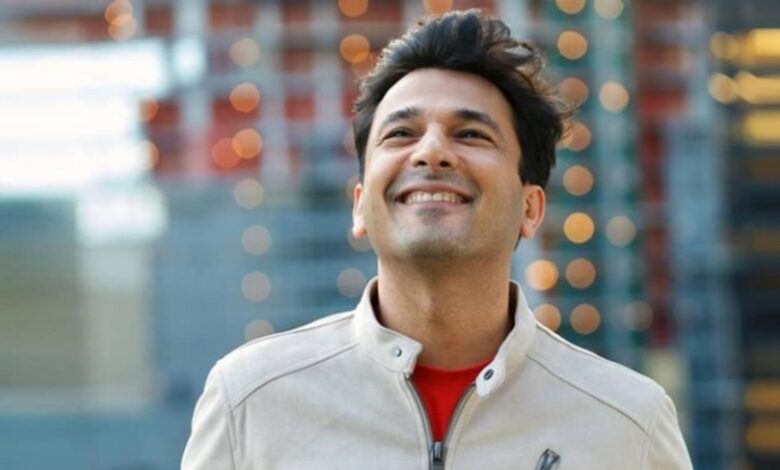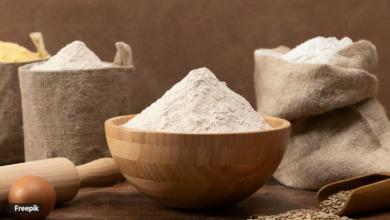‘I am not too loud—so no chillies or anything spicy’

“From Indian chefs earning Michelin stars to gaining recognition on global stages, from restaurants with sold-out reservations to Indian cuisine being celebrated worldwide—it’s an entirely new game,” Chef Vikas Khanna said while sharing his journey—from growing up in Amritsar to becoming a Michelin-starred celebrity chef recognised globally.As a celebrated chef, author, and filmmaker, Chef Khanna rose to fame as a judge on MasterChef India and has made his mark internationally through appearances on MasterChef Australia, Throwdown! with Bob Flay, and Hell’s Kitchen with Gordon Ramsay.
In a candid conversation with , Khanna spoke about the global rise of Indian cuisine, his views on fusion food, the experiences in Amritsar that shaped his culinary journey, and more. Edited excerpts below:
Story continues below this ad
Q: Food is often seen as a powerful medium for storytelling. How do you use food to connect people with India’s culture, hory, and emotions?
Vikas Khanna: I don’t think any emotion is greater than that food evokes. Whether it’s art, music, storytelling, or cuisine, we inherit a certain part of the story. As we grow older, we travel, we learn, and new chapters continue to be added.
When we were growing up, our stories were somewhat limited. But today, with the rise of travel, India is at the forefront of numerous culinary adventures. The narrative is evolving, but the emotions tied to food remain the same—it’s always about connection and nostalgia. Every dish carries a story.
Q: You’ve spoken about how your grandmother’s cooking deeply influenced your passion for food. Is there a particular dish or technique she taught you that remains special to you?
Vikas Khanna: Absolutely. We come from a generation where nothing was store-bought—everything was handmade. After Holi, it was time for wadiyan (sun-dried lentil dumplings)—I can still vividly remember their aroma. As summer arrived, Punjab’s famous Langda mangoes would be in season, and making homemade ice cream with them was a tradition. Those familiar scents, flavours, and cooking techniques shaped my approach to food, and they remain just as important to me today.Story continues below this ad
Q: Fusion cuisine is often debated—some believe it enhances culinary diversity, while others argue it dilutes authenticity. What’s your perspective?
Vikas Khanna: If I comment on this, it might seem like I’m commenting on people—but that’s not the case. The food we serve and celebrate in restaurants, especially mainstream ones, is essentially fusion. More than just individual or cultural representation, it’s about what resonates with people at a given moment.
A few generations ago, tomatoes weren’t part of Indian cuisine. Their introduction was a form of fusion, right? Today, we often have a myopic perspective on fusion. True fusion hasn’t fully arrived yet, except for chefs like Manish Mehrotra, who redefined Indian cuisine and set new benchmarks.
Eventually, fusion will evolve naturally because dining habits have changed. People have more spending power and eat out more often. For them, chefs, restaurants, and investors have to offer an experience, an individual expression, and not just food.
For chefs like us, who run a single restaurant on a large scale, it’s challenging to create dishes that people can find anywhere. If diners are making reservations and waiting for months to get a table, you have to bring something new to the table, call it fusion or creative expression. I’m fine with it, as long as the food is delicious.Story continues below this ad
Q: With restaurants worldwide—including your latest venture, Bungalow in New York, you’ve played a key role in shifting global perceptions of Indian food. What has been your biggest challenge, and where do you see Indian cuisine heading?
Vikas Khanna: The last 25 years have brought a massive shift—one that I’ve witnessed firsthand since moving to the United States of America. Many chefs came before me, and many more will follow, but we can’t deny the significant transformation that has taken place.
From Indian chefs earning Michelin stars to gaining recognition on global stages, from restaurants with sold-out reservations to Indian cuisine being celebrated worldwide—it’s an entirely new game.
The real question now is sustainability. Younger chefs with fresh ideas will come in, work hard, and push things forward. They will open more doors, and I couldn’t be prouder of that.
I’m often asked why, in India, any international achievement an Indian chef almost always starts with my name in news articles or tweets. The reality is that many Indian journals don’t actively follow global culinary awards like Michelin or 50 Best because they’re not yet mainstream here. We celebrate the Oscars but not food achievements in the same way.Story continues below this ad
For someone like me, who has been there and done that, celebrating these achievements is important because I know how hard it is to maintain a presence on the international stage. To be consently ranked at the top takes a different level of discipline and dedication.
Q: Are there any traditional Indian dishes you believe should be brought back into the limelight?
Vikas Khanna: Right now, South Indian cuisine is having a major moment, especially with SEMMA receiving a Michelin star in New York. Chef Vijay is doing an incredible job.
In London, we’re also seeing remarkable chefs like Asma Khan bringing Indian cuisine and its stories to the global forefront, alongside pioneers like Vineet Bhatia and Atul Kochhar—each playing a significant role. I always say, perhaps even too openly, that I receive far more credit than I’ve actually worked for. Many chefs have been working tirelessly for decades.Story continues below this ad
I was fortunate to gain a global platform largely because of what was happening in London, where Indian cuisine was becoming the dominant culinary force. Meanwhile, in New York, people were still trying to find the right hook for it. And sheer timing, space, and the opening of Junoon, along with the global accolades it received, Indian cuisine was propelled forward.
At its core, our food remains deeply desi. The dishes I cook at Bungalow are desi, entirely rooted in traditional Indian flavours. Moving forward, I hope to see more young chefs entering the industry with fresh perspectives. That’s how evolution happens.
Q: Indian cuisine is known for its rich cooking techniques and traditional tools. What are your kitchen must-haves?
Chef Vikas Khanna launched Bergner’s Argent Samsara & Hitech Giro X collection. (PR Handout)
Vikas Khanna: When working in a high-volume kitchen where everyone is paid the hour, convenience is key. Running big restaurants isn’t easy. For me, a high-quality spice grinder has been the biggest game-changer. I won’t name the brand, but after using hundreds, I have one absolute favourite. Of course, I use an industrial version—otherwise, I’d go crazy. We don’t buy pre-ground spices; grinding everything fresh is labour-intensive, but it’s worth it.
Q: What’s the most common misconception about chefs?Story continues below this ad
Vikas Khanna: We cook the same elaborate meals at home. Reality? We eat simple food.
Q: If your personality were three ingredients, what would they be?
Vikas Khanna: I am not too loud—so no chillies or anything spicy. I’m more subtle in my daily behaviour, so something mild yet impactful, like sauf (fennel).
Q: Lastly, you’ve been a chef, filmmaker, and author—what’s next?
Vikas Khanna: One of the biggest projects of my life—a film with Shabana Azmi and A.R. Rahman about a field chef in New York. It’s possibly my best work yet.







